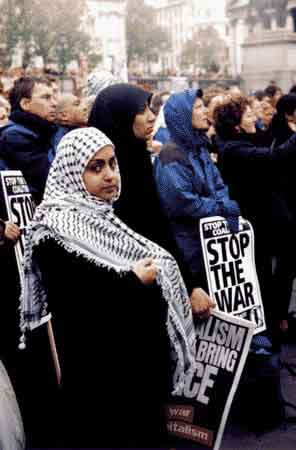

If you would like to buy a copy of this book
click here
|
Home | SchNEWS OF THE WORLD  Trafalgar
Square, Nov 18th Pic: Lawrence Renee Trafalgar
Square, Nov 18th Pic: Lawrence Renee
All We Are Saying...Report From UK anti-war Movement In the aftermath of 11 September - and particularly once the attack on Afghanistan started - the 'anti-war movement' took flight. In the first week after the bombing started, there were around 400 known protests in 40 countries. 100,000 gathered in Rome, 30,000 in Naples, and despite all the blind ignorant patriotism and media rubbish, there were mass demonstrations in the US including 25,000 marching in Washington. All sorts of anti-war coalitions and networks sprang up all over Britain: Muscling in immediately in London were the Socialist Worker Party/Socialist Alliance/Globalise Resistance grouping who convened what it hoped would be a Britain-wide coalition to Stop the War (STW) on the usual 'committee' basis (SchNEWS are gutted we weren't part of that - ed). As it turns out many groups around the country preferred to work with their own networks, staying out of the London STW framework. A grassroots anti-war movement mobilised all over the country, in all sorts of amazing ways. Of course there were the headline events, such as the massive CND and Stop The War coalition demonstrations in London including the 100,000 strong 'Not In Our Name' march on November 18th, and 40,000 marching in solidarity with Palestine in May. More at the grass roots level: a vigil was held every day in Bristol outside the Hippodrme, and continued all through the winter. Three coalitions emerged in Wales, one of them being the North Wales 'Coalition for a Just Peace', initiated by peace activists also involved in Welsh language activism and Plaid Cymru. As in Wales, the Scottish activist scene saw amicable relations between different elements: Women in Black, religious groups, trade unions, nationalists, greens, CND and other peace groups, and the Scottish Socialist Party all came together to form and support the 'Scottish Coalition for Justice not War'. The Quakers played a role in the anti-war movement by opening up their meeting houses for action planning. Amongst others the Newcastle Stop The War group came through this - and went on to function as a loose network rather than a formal 'committee' system as preferred by the Stop The War bods. Up and down the country groups - such as the 'Justice Not Vengeance' affinity group in London, and the ongoing 'Direct Action Against War Now' network (DAAWN) - held vigils and weekly meetings for months. Groups also campaigned against anti-Muslim and racist prejudice. In February 2002 ARROW and Voices in the Wilderness UK hosted a visit by two relatives of Craig Amundson, who died in the Pentagon on 11 September. Craig's brother Ryan and his sister-in-law Kelly Campbell spoke out against military retaliation, and announced the formation of 'Peaceful Tomorrows', an anti-war network of US September 11 relatives www.peacefultomorrows.org. There have been all kinds of civil disobedience, including the ARROW-initiated sit-down in Whitehall on 13 October 2001, when 600 people blocked off one side of Whitehall for an hour and a half; several blockades at Northwood, the headquarters of Britain's expeditionary forces (organised by the 'D10' group); lock-ons at Downing Street; lamp-post climbing in Parliament Square; sit-downs during some of the big marches (organised by 'DAAWN'); and 'die-ins' in Manchester. In 2002 much of the focus of the anti-war movement moved to the threat of war on Iraq, and Israel's brutal occupation of Palestine. The media manipulated public attention by treating the war as having finished when the Taliban were taken from power - but the bombing and military presence continues (as it does in Iraq a decade after the Gulf War). Thanks to Milan Rai ARROW (Active Resistance to the Roots of War) |